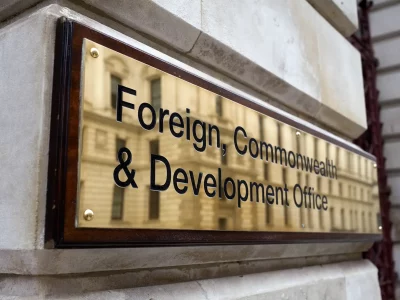

The Social Context of the Law: Do Magnitsky Type Sanctions Develop the Rule of Law?
Taken from the recording of The Inner Temple Social Context of the Law discussion with Bill Browder (CEO and Co-Founder of Hermitage Capital Management, Head of Global Magnitsky Justice Campaign) and Bronwen Maddox (Director and CEO of Chatham House). Moderated by Master Geoffrey Nice (Gresham Professor of Law 2012–16, Co-Founder of Geoffrey Nice Foundation, 2014).
Bill Browder: When the Magnitsky Act went to a vote, it passed the Senate 92 to 4. It passed the House of Representatives with 89 per cent, becoming a federal law on 14 December 2012, and Vladimir Putin went out of his mind. He went completely crazy. He is a guy who commits human rights abuses, he keeps his money in the West and he values money more than human life, so he understood very clearly that his own fortune was potentially at risk.
His first retaliation was to ban the adoption of Russian orphans by American families, his second was to make it his single largest foreign policy priority to repeal the Magnitsky Act, and the third thing he wanted to do was to come after me. Since then, I have been threatened with death, with kidnapping, and I have been on the Interpol Red Notice list eight times which applied for my extradition from the UK on multiple occasions. They have sued me all over the world for defamation and for all sorts of things. They make movies about me et cetera.

But neither the US nor I were intimidated and, after the Magnitsky Act was passed, the senators who were my partners in this exercise said, “If Putin is so upset by this – and there are probably a lot of other dictators that should be upset as well … we should make this the Global Magnitsky Act.” In 2016, the Global Magnitsky Act passed. I got the Canadians to pass the Canadian Magnitsky Act unanimously in 2017, and then [it was passed] here in the UK in 2018, in the European Union in 2020, and in Australia in 2021. In between all this, Norway, Iceland, Kosovo, Montenegro, the Channel Islands, all have Magnitsky Acts, and a lot of people have been sanctioned all over the world in Russia and various other places. When Putin invaded Ukraine, there was no debate about at least one of the major policy responses, which is we use the template of freezing the individual’s assets and banning their visas. And as you all know, thousands of people have been added to the sanctions list for invading Ukraine.

The Magnitsky Act has been applied to the Chinese officials involved in crimes against the Uyghurs. It has been applied to Iranian officials involved in all the atrocities there, to Nicaraguans, to Venezuelans, to all sorts of bad actors. And it is a quite remarkable tool, because it is like the modern cancer drug – the old cancer drugs nearly killed the patient to kill the cancer cells, and the new cancer drugs go after the cancer cells directly. That’s what the Magnitsky Act is. I know how powerful it is, because I know how angry anybody who gets put on the Magnitsky List is. Their financial lives effectively screech to a halt. No bank will do business with them, no company wants to do business with them. Their credit cards get cancelled. It becomes a total disaster for them.
It is a quite remarkable tool, because it is like the modern cancer drug – the old cancer drugs nearly killed the patient to kill the cancer cells, and the new cancer drugs go after the cancer cells directly. That’s what the Magnitsky Act is.
So, to address the question of the evening: does it advance the rule of law? I think the Magnitsky Act is a tremendous advancement of the rule of law, because there is no law that deals with atrocities, murders, torture et cetera that are committed in a country that has no rule of law, where we do not have jurisdiction outside the country to prosecute those crimes. In the Magnitsky case, there was no ability to prosecute anyone for what they did to Sergei Magnitsky, and with the Magnitsky Act, now there is. I will never be able to recover from the guilt or the responsibility of Sergei Magnitsky effectively being killed in my service, but as Sir Geoffrey said, it is very rare to have a name on a law and since they are not going to build any monuments for Sergei Magnitsky in Russia, we now have a legal monument for Sergei Magnitsky in the Magnitsky Act.
It is very rare to have a name on a law and since they are not going to build any monuments for Sergei Magnitsky in Russia, we now have a legal monument for Sergei Magnitsky in the Magnitsky Act.
Bronwen Maddox: Apparently, questioners are not allowed to pay tribute to those of us speaking, but I want to start by paying tribute to what Bill has done. He has not given up on trying to bring some kind of accountability in a country that does not respect the rule of law. He deserves every award for bravery on that. All the same, I am uneasy on several points about what he said, and about this being the new model – the new and improved cancer drug, if you like. I’ll give you three reasons why. Let me just say first, that you can spend your life writing about whether sanctions work or not. There are many things to be said for them, they are an alternative to doing nothing and going immediately to war.
But my starting point is that sanctions are a really useful tool. I start, as well, with context – using that word from our title – by saying that we are in a time when the rule of law really does need defending. It is up for grabs. You have some countries, and Russia is in a sense a rogue, saying, “Doesn’t suit us to recognise it.” You have others – I would put China top of this list – saying, “Well, we see the world really, very, very differently. We interpret these rules differently. We are out to promote a really very different way of organising relations between people and between countries.” And all kinds of other countries are saying, “Well, make it worth our while to be interested in something as abstract as international law.” All these rules, they might say, were written by the West, principally by the US. We were not round the table. They were written to suit those countries, and if you really want us to care about them then give us a seat at that table, and by the by, do other things that we care about as well. So we might care more about Ukraine, if you do something about climate, finance, and so on. That is a really powerful, loud argument at the moment, which is itself a challenge to the layers – sedimentary layers, such as they are – of international law. So these are the reasons why I am uneasy that these very targeted sanctions on people, on individuals, are the brave new way ahead.
The first is that it gives more currency to the charge that the Global North (if I can use that term) is out to write the rules to suit itself, and principally the US within that, because these sanctions do not work unless you have some economic heft behind them. And yes, other countries have come in behind the US, as well as the EU – so there are a lot of countries – but it is because of the US’s economic heft that these have some bite – that Putin cannot do what he might want with his money. This does give more charge to the sense that you are doing it because you do not like Putin and those on the list.
That brings me on to my second point, which is: once you start down that road, it does not take very long for you to get a bit queasy about what this does to the rule of law. You have to show that [the rule of law] is there, that it applies to all people equally, that there is a degree of transparency, that there is some kind of accountability and some kind of judging of whether it is fair. It is very hard to do that with what is really a list of people that has come out of an agreement between some senators and Bill Browder, or some people in the European Commission. It is really very, very hard to show that there is process, that there is fairness, that this is not a political motivation – and very hard to use the sanctions in a way that does not accentuate the division we are all feeling between the West, China and Russia, and many other countries.
I think it is very hard to give that kind of assurance without some sense of oversight of the sanctions through all kinds of mechanisms that are very much improvised and targeted.
My third point is that it is very hard to know if the sanctions are effective or not. It is very hard to know how the people who they are targeted against experience them. They are easier to evade than if they were global. They are showy – but do they actually work? We have not yet seen many big changes of behaviour. It is just that it is obviously inconvenient for these people, and it feels very good to those launching the sanctions against them. But do they actually work?
So, my reservation about all this is starting from the point that sanctions are often a very good thing and a way of bringing about accountability, but for all that it sounds like a form of accountability, it isn’t. It is an improvised and partial remedy for what is, in fact, a lack of accountability. But that is a bigger problem than this particular measure can answer.
My reservation about all this is starting from the point that sanctions are often a very good thing and a way of bringing about accountability, my reservation about this is that for all that it sounds like a form of accountability, it is not.
Sir Geoffrey: Well that generates, in many of us, an obvious question for each side. For Bill, how do you meet this allegation of unfairness and satisfaction on the part of the doer and lack of accountability? But to Bronwen, if sanctions are an alternative to the gun, however unfair or inefficient, do you have a better alternative?
Bill Bowder: I want to address the question you put to Bronwen as well. There is a famous chess player, chess champion, chess grandmaster, Gary Kasparov, and he had a great quote when he was also working on the Magnitsky campaign, and he said, “Let’s fight them in the banks instead of with tanks.”
Let’s fight them in the banks instead of with tanks.
If you can fight and go to war with financial tools, it is a lot less bloody and a lot less awful than with guns. But the real problem with the Magnitsky Act, and with sanctions generally, is that we passed this law, and it was used in the Magnitsky case and it was used in other cases, but it was used really sparingly. It was almost impossible to get someone sanctioned, and still is. Sanctions have two possible functions: they can either be a deterrent or they can be a punishment. And if you use them properly, they could be a very powerful deterrent. I actually believe that if we had used sanctions after Putin invaded Georgia, if we had sanctioned the top 50 oligarchs after he invaded Georgia, or the top people in his regime, he might have thought, “Well, these people in the West are serious. This costs us a lot, and it is very painful.” And he might not have invaded Crimea. Or if we had sanctioned after Crimea, he might not have done the full-scale invasion in February 2022. But we did not. There was so much wanting to be seen doing something, and not actually doing something, that we did these tiny little sanctions here and there, but we never did them properly and so it was not a deterrent. Now that he has launched this full-scale invasion, we have gone from a very limited sanctioning situation to probably a hundred times greater sanction situation as a punishment. But the problem with the punishment is that when Putin decides to go forward, when he decides to invade, he cannot now back down.
So, the only way that we can win the war, and stop the war with sanctions, is to completely starve them of financial resources. And the sanctions have been very extreme. In addition to tens of hundreds of billions of dollars of oligarch money being frozen, there are $300 billion of Russian Central Bank reserves frozen. Russian banks and companies have been cut off from the international capital markets. Companies have left Russia. All very powerful and painful sanctions for the Russian economy, but Russia continues to be able to sell oil to the tune of half a billion to a billion dollars a day. As long as they can do that, they are going to continue to have money – they can continue to buy weapons and they could continue to kill Ukrainians. So we’re in this terrible world where, because we did not use sanctions properly, we now have to use them much more, and we still have not got the stomach to use them completely.
And just one last point I wanted to make in response to what Bronwen said, the rule of law as it applies to sanctions was one of the big issues. I must have gone to 25 different parliaments around the world to testify in favour of Magnitsky sanctions. The obvious question was exactly this: this is an administrative punishment, what rights do the recipients have if they believe that they have been sanctioned improperly? And I said, I think you should build a mechanism into the sanctions programme that every person who’s put on a sanctions list has an opportunity to appeal their sanctions. In every country that has Magnitsky sanctions, there is a procedure where you can go to a court, you can challenge the sanctions. I view sanctions in the same way as you would an ex parte freezing order, which is that somebody can go in and freeze someone’s assets, and then the assets stay frozen until somebody appeals. I think that that’s the same legal remedy that people who have been sanctioned can use.
Bronwen Maddox: I will accept anecdotes about deterrence as some evidence that it works, but it does not reassure me at all. And your final point that people around the world think that you are somehow responsible for this list – I am thinking of the Mikado, “I have a little list”, if that is not too retro a reference for everyone – that itself is worrying: that people do not know the process. They think that you go to Congress, get one of these lists started and then it snowballs.
So I think that concern still hangs there. You asked, Geoffrey, what could be better? And I think we have two questions there. Putting sanctions against a state, compared to sanctions against an individual. Here, we are talking about sanctions against an individual, and it seems to me that sanctions against a state do not raise the problems that I have been suggesting to you. There were sanctions against South Africa, as well as a civil society boycott. You can more clearly point to the state as an organisation that had done something and not have, I think, the same real worry about partisan targeted action that taking cases against an individual gives.
I am aware that there are exactly the same arguments at the moment about whether cases in Gaza should be brought to the ICJ or ICC, and the latter giving people some of the same queasiness, sometimes about why you pick some individuals and not others. I think that is one big problem. I found much of what you said very interesting – I was scribbling all kinds of things – but I think it really comes back to that point of whether we can be comfortable, in a sense of fairness, even if we can produce lots of anecdotes that people really, really do not like being sanctioned and so will to some extent get away from it. It does not really demonstrate that overall, they work as well as sanctions against a state in getting that state to change direction. And I am still bothered by the questions of fairness.
Sir Geoffrey Nice: Our audience could hardly have had a better elucidation and clarification of the issues. It is not possible to sum up what has been said, save perhaps to observe that in the truly desperate times in which we live, were it not for sanctions, we would be turning even more to such legal systems as exist, such as the International Criminal Court, hoping that those activities which are rule of law systems might save us from where we are going. On the other hand, thousands, millions of people get fed into war machines because of political failure, and we do not want it to happen too much longer, because it is foolish to say, “Never again.”
For the full video recording: innertemple.org.uk/sanctions
Sir Bill Browder
Bronwen Maddox
Sir Geoffrey Nice KC
